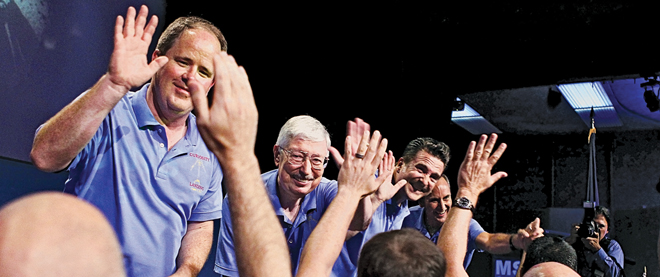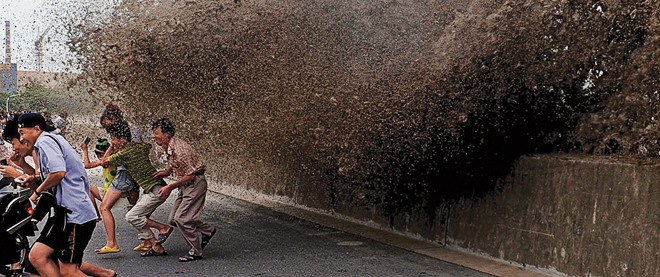Good news

Escape from Syria
The death toll surpassed 20,000 and a frustrated Kofi Annan stepped down as the UN’s special envoy to Syria. But it was President Bashar al-Assad who suffered the toughest defeat last week: his prime minister, Riad Hijab, fled to Jordan to join the other side. Hijab is the highest-ranking government official to denounce Assad’s “murderous” regime, and his bold defection could be a fatal turning point for Syria’s dictator. We can only hope.
Red rover, red rover
Eight months and 566 million km later, the newest Mars rover—Curiosity—landed safely on the red planet. The dramatic arrival triggered Olympic-sized cheers inside NASA’s Jet Propulsion Laboratory, where dozens of scientists (including one sporting a red-and-black mohawk) celebrated what could have been a US$2.5-billion crash and burn. Instead, Curiosity is scheduled to spend the next two years driving around the crater floor, scooping up soil samples and beaming photos back to Earth.
Protecting the public purse
Allaudin Merali, a senior Alberta health official, ran up more than $346,000 in taxpayer-funded expenses—including $1,750 for repairs to his Mercedes, $900 at a wine store, and $2,300 for a new car phone. His punishment? No severance package. “If Albertans are going to have confidence in our health care system,” said provincial health minister Fred Horne, “it is imperative that they know we are doing everything we can to ensure we never see something like this again.” Bev Oda sure is lucky she was a federal MP, and not an Alberta bureaucrat. The free-spending cabinet minister (a $16 orange juice, $1,000-a-day limo service) officially resigned last week, triggering a plum $52,000-a-year parliamentary pension.
Let’s follow the light
Is there truly life after death? A California university has been awarded a whopping US$5-million grant to try to find out. Led by philosophy professor John Fischer, The Immortality Project plans to examine “near-death experiences and try to find out what’s going on there—what is promising, what is nonsense, and what is scientifically debunked.” The bad news? Researchers have already decided that alien abductions will not be part of the study.
Bad news

All the warning signs
Two mass shootings in the United States—one at a suburban movie theatre, the other at a Sikh temple—have triggered the same heartbreaking question: should the authorities have seen it coming? A new report says the psychiatrist who treated suspected theatre killer James Holmes personally warned a University of Colorado police officer about her client’s strange behaviour, just weeks before he allegedly massacred 12 people. In Wisconsin, meanwhile, Wade Michael Page was a vocal white supremacist who used the Internet and his heavy metal music to rally fellow racists. A year before he opened fire inside the temple, Page encouraged others to “stop hiding behind the computer.”
A bite to the wallet
Start clipping those coupons. According to leading economists, food prices could climb by as much as four per cent next year as North American drought conditions continue to inflate the cost of almost everything we eat. As corn crops wither the effect will make its way through the food chain, since corn is used to feed livestock. Michael McCain, the president and CEO of Maple Leaf Foods, is already warning consumers to brace for price hikes in the months to come.
Not so therapeutic
Chemotherapy—widely considered the most effective cancer-fighting treatment—may actually be accomplishing the opposite: making cancer worse. A new study says the aggressive treatment that kills both cancerous and healthy cells can cause those healthy cells to secrete a protein that sustains tumour growth and resists further treatment. In other words, chemo can actually promote tumour growth rather than limit it. Not surprisingly, researchers described their discovery as “completely unexpected.” What it means for future cancer treatments is equally unclear.
On drugs
Barry Bonds, the undisputed face of baseball’s steroids era, has broken a lengthy silence—to insist that he and his tarnished home runs belong in the Hall of Fame. “Without a doubt,” he says. “There’s not a doubt in my mind.” If he truly believes that, there isn’t much else in his mind, either.